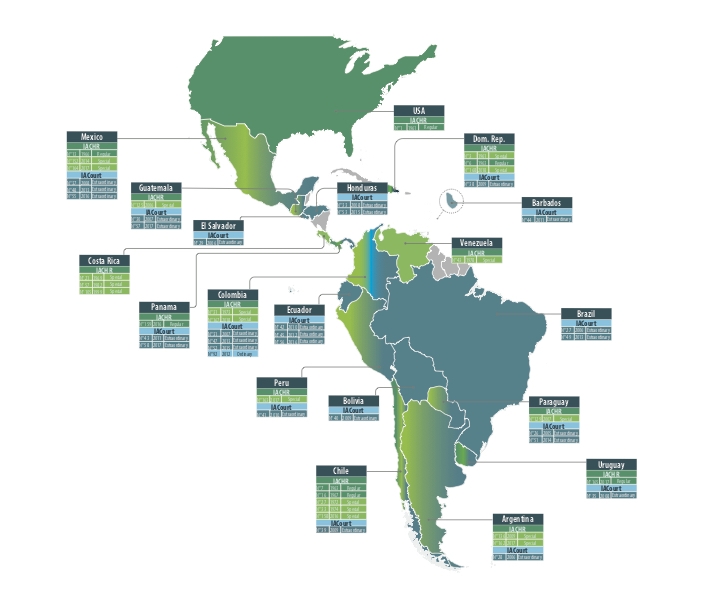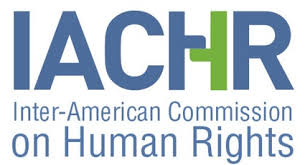Human rights watchdog fights anti-gay abuses in the Americas
Colin Stewart is a 45-year journalism veteran living in Southern…
LGBTI citizens of Jamaica, Peru, Brazil, Paraguay, Argentina, Venezuela and elsewhere have been beneficiaries of the work of the Inter-American Commission on Human Rights.

In this article, human rights lawyer Luiza Drummond Veado from the University of Essex describes the workings of the regional human-rights agency. The article is published here courtesy of ILGA, the International Lesbian, Gay, Bisexual, Trans and Intersex Association:
The Protection of the Rights of LGBTI People by the Inter-American Commission on Human Rights

The Inter-American Commission on Human Rights (IACHR) is one of the main bodies of the Organisation of American States (OAS) that promotes and protects human rights in the 35 States of the region and, together with the Inter- American Court of Human Rights (I/A Court), forms the Inter-American System.
Since 2011, the Commission has a Thematic Unit on the rights of LGBTI persons, which later became one of its Rapporteurships. Through this Rapporteurship, the IACHR monitors the situation of this population in the Americas, working with States and civil society, as well as other regional and international actors. It also processes individual petitions and cases related to SOGIESC.
Public hearings
In 2018, the IACHR heard diverse concerns from civil society organisations and received information from the States in several thematic hearings. In particular, the Commission received information on gender and sexual diversity policies in Paraguay, the human rights situation of trans people in Argentina, the situation of LGBT people deprived of liberty in the Americas, violations of economic, social, cultural and environmental rights of LGBTI people in the region, the political crisis in Venezuela and its effects on the LGBTI community and equal marriage in the Americas, as well as various intersectional issues that affect the lives of LGBTI people in the continent.
System of petitions and cases
In 2018, the Commission published reports on individual cases on issues of sexual orientation and gender identity.
The IACHR took the case of Azul Rojas Marín against Peru before the Inter-American Court of Human Rights. This is the first case of violence against LGBTI persons before that court and refers to the illegal, arbitrary and discriminatory arrest of Azul Rojas Marín, who then identified as a gay man (she currently identifies as a trans woman). Azul suffered serious acts of physical and psychological violence perpetrated by state agents, including various forms of sexual violence and rape.
The IACHR found that the acts of violence against the victim were carried out with special cruelty because the state agents had identified Azul Rojas Marín as a gay man. The Commission also found that the facts of the case constitute violence based on prejudice and considered that the constitutive elements of torture are also present. In addition, throughout the investigation, the victim was humiliated, and her credibility questioned by judicial authorities, from the initial report until the final decision.
Thus, the IACHR considered that the State of Peru violated the State obligations to respect and fulfill the rights of a victim who denounces sexual violence, with the aggravating prejudice against LGBT people. This is a great opportunity for the Inter-American Court to issue a paradigmatic decision with clear standards on the protection of LGBTI persons against violence.
Additionally, the IACHR published the admissibility report in the case of Gareth Henry, Simone Carline Edwards and families on acts of discrimination and violence in Jamaica based on the sexual orientation of the victims. Such acts of violence forced both alleged victims to leave the country and apply for asylum abroad. The alleged victims place great emphasis on the existence of sodomy laws in Jamaica, alleging that it legitimises structural discrimination against LGBT people.
Precautionary measures
In 2018, the IACHR issued two precautionary measures in favour of human rights defenders of LGBTI persons in Brazil.

The first was awarded to Mónica Tereza Azeredo Benicio, partner of Marielle Franco, a well-known defender of afro-bisexual human rights murdered in Rio de Janeiro. The Commission understood that the alleged threats, harassment and persecution, among other acts of intimidation, could be related to the complaints that the beneficiary has been filing in recent months in relation to the murder of her partner, as well as her willingness to assume her legacy and continue her important work.

The second precautionary measure granted in 2018 was granted to Jean Willys de Matos Santos, the and to his family, in relation to possible threats against his life and personal integrity. According to available information, the threats are directly related to his work as a human rights defender and as a gay man. It is important to underline that Jean Willys subsequently left Brazil due to the threats suffered and did not take up his seat in the congress, even after the issuance of the precautionary measure granted by the Inter- American Commission.
Other lines of work
In addition to all these decisions, the IACHR conducted a public consultation related to the protection of economic, social and cultural rights (ESCR) of trans people in the Americas and collected numerous responses through a public questionnaire. It also issued several press releases highlighting the advances and setbacks in the region on the rights of LGBTI people and held a joint event with the United Nations High Commissioner and the African Commission on Human and Peoples’ Rights. Finally, the IACHR also launched a campaign composed of six videos about serious human rights violations against LGBTI people that continue to exist in the Americas and the Caribbean.
Over the past decade, the Inter-American Commission has made broad strides and has developed an innovative and coherent case law for the comprehensive protection of LGBTI people at the regional level. In addition, these developments grow through cases and reports published by the IACHR. At the same time, Member States make progress by enacting new laws, issuing judicial decisions and implementing public policies on issues of sexual orientation, gender identity and expression, and sexual characteristics.
The protection of the human rights of LGBTI persons is a complex, dynamic and multifaceted process. Certainly, there are still many barriers and shadows down the road. Violence and discrimination still govern the daily lives of many LGBTI people in the hemisphere. However, victories and advances continue to be achieved.
The Americas have proven to be a region that —not without difficulties— has developed numerous laws, policies and programs that are among the most advanced on the planet to recognise, protect and empower LGBTI people. Those victories are only possible thanks to the work of LGBTI activists, defenders and agents of the State that join the struggle, so that we can all be free and equal in rights and dignity.




